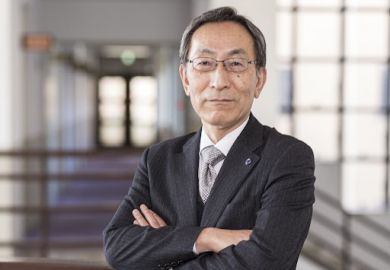English university leaders have been accused of “meekly ceding” institutional autonomy to the Westminster government in a process likened to Stockholm syndrome by a former vice-chancellor who lamented the “enshittification” of academic work.
In a new paper, Nigel Thrift, who headed the University of Warwick for a decade until 2016, warns that the “industrialisation” and “standardisation” of higher education institutions “threatens the very nature of what a university can be”.
He blames governments, which he says have “systematically starved universities of funds and choices”, and of “mov[ing] away from any serious concern for university autonomy, firing off missives about this, that and the other, sometimes with what seems like abandon”.
He complains that universities are being “pickled” in regulation, including from the “whale” of the Office for Students, which is “seemingly intent on turning universities into large schools or colleges”, and from UK Research and Innovation, which Thrift says is “seemingly intent on smothering initiative by producing more and more initiatives that limit the ability of academics to follow their own star”. The result, he says, is institutions “that increasingly look like clones of each other”.
On the other side, Thrift says that university management has largely “done as it has been told” in the hope of getting “a tiny bit more money”. “It hasn’t exactly rolled over and played dead, but sometimes it can feel as though it is dangerously close to Stockholm syndrome,” says Thrift.
Too often universities have followed the “same playbook” of recruiting more students, hiring more casualised academics and constructing more buildings, says Thrift, who notes that strategic plans, “which usually involve borrowing, seem to have become one of the main ways for a vice-chancellor to show that something ‘strategic’ is going on”.
“The net result of all this necrotising of vital tissue is straightforward enough. A mess. Some messes are good but this isn’t one of them…Government, universities, students, academics – you name it, they’re all pissed off, each in their different ways.”
Since leaving Warwick, Thrift has warned against the “Australianisation” of UK higher education in which the underfunding of research forces “helter-skelter growth” upon the sector, and criticised the downgrading of outputs in the next Research Excellence Framework in favour of rewarding team science.
In his new paper, published in Transactions of the Institute of British Geographers, Thrift strikes a different tone to commentators who have blamed universities’ woes on the rise of neoliberalism, instead pointing the finger at the “industrialisation” of academia, including an increasing division of labour which means that “actual producers [of knowledge] have increasingly little control of the production process and have become increasingly distant from management”.
“Industrialisation is associated with mass production and the kind of standardisation and intensification of practices that is inimical to creative work, both tendencies that tend to result in an enshittification which modern university management no doubt abhors in theory but is moving ever closer to practising,” Thrift warns.
Lamenting increasing teaching demands, bureaucratic overload and the decline of intra-university institutions such as senates and even semi-autonomous departments, Thrift says academics are at risk of becoming “drones”.
“Academics are at the core of what universities are about. Without them, universities wouldn’t exist. They are the intellectual firestarters. But their world and their time have become increasingly constrained,” he adds.
By way of solutions, Thrift – now an emeritus professor at the University of Bristol – proposes an “inclusive deliberative process”, similar to a citizens’ jury or a royal commission, as a way for academics to “thrash out a common platform that would revive the idea of the university”.
Such a forum would have to come up with “really radical” solutions to fundamental issues such as the reluctance of governments to properly fund higher education, whether research and teaching can “continue to coexist in universities, at least as they are currently set up, or [whether] they should be split off from one another with research taking place in large research heavy or research-only institutions”, and how higher education can regain some diversity of approach, including allowing “at least some” institutions to be more than an expensive rite of passage for young people, Thrift says.
“The system needs wholesale reinvention as a system, but one with more anti-system in it…Its various universities need to be given more room to make up a diverse system of institutions which have less incentive to fall in line,” Thrift says. But he adds: “I doubt that will happen.”




